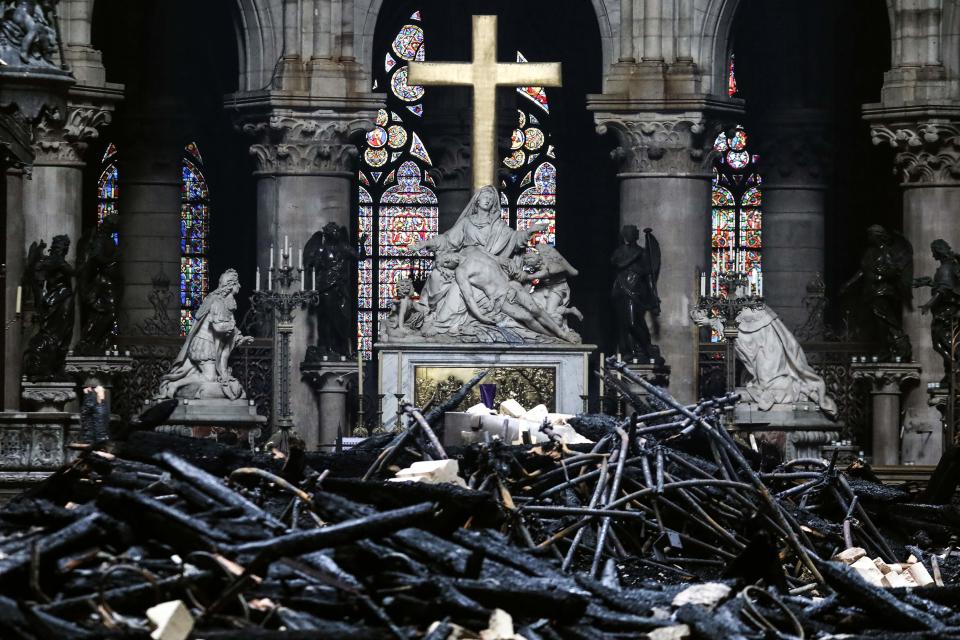Notre Dame fire: Why should France rebuild cathedral? Embers of Christianity still burn.

The tragic fire that nearly destroyed Notre Dame Cathedral in Paris on Monday stunned France, western Christianity, and much of the world. Although the shocking fire did extraordinary damage to the world-renowned building, its effect is a stark illustration of the empty, blackened hole at the heart of secular Europe. The ruined cathedral is both metaphorical and metaphysical.
In his 2005 book, "The Cube and the Cathedral," Catholic scholar George Weigel contrasted the secular vision that produced La Grande Arche de la Defense in Paris (a postmodern monstrosity) with the Christian vision that produced Notre Dame Cathedral. Weigel expressed concern that the new European Union constitution of 2004 intentionally left out the Christian history of Europe as a source of its values. Indeed he questioned whether the EU can survive as a democratic polity when it has lost both its foundation and with it any hope for the future.
French President Emmanuel Macron announced Monday night, “We will rebuild this cathedral together.” But to what end?

Read more commentary:
After Notre Dame Cathedral fire, Paris lost much more than just a church
As a Paris tour guide who ignored Notre Dame, I forgot ancient cities don’t last forever
Can you be a former Catholic? With new betrayal on child sex abuse, I'm about to find out
Europe’s long-term trend towards secularism that began with the Enlightenment continues unabated. The Pew Research Center last year completed a massive study on Christianity in Western Europe. While most European adults identify as Christians, many of them are no longer practicing their faith. In every country except Italy, non-practicing Christians outnumber regulars at church. A separate study from Pew found that, weekly church attendance everywhere except Poland is below 25% and in some cases in the single digits.
European Christians are also losing their theology. Most non-practicing Christians in Europe believe in God, but only 24% believe in God as described in the Bible. According to a survey by Ligonier Ministries, one third of people in the United Kingdom say “I don’t know” when asked whether trust in Jesus alone leads to salvation, whether the resurrection actually occurred, hell is real, or Jesus will return.
Europe is losing it's religion
The trends among European young people are dire. British researchers have found that most young people are not identifying with or practicing religion. In the UK, only 7% of youth identify as Anglican, and 10% as Catholic; 6% are Muslim. In the UK, France, Belgium, Spain and the Netherlands, between 56% and 60% say they never go to church. With the exception of Catholic youth in Poland, Lithuania, and Ireland, the vast majority of young people in Europe are now unchurched.
Scandals in the Christian church have contributed to declining religiosity among the faithful. According to Pew, 53% of European “nones” who were raised in the Church cited scandals involving religious institutions and leaders as a factor in their decision to stop identifying with the faith of their fathers.
God is not dead in Europe, but many are no longer following Him. The shell of Notre Dame Cathedral remains, with the hope that the structure may be rebuilt. Will the shell of European Christianity be revitalized? There are signs that this may be happening already.
There are, however, glimmers of hope
In Germany, the state Lutheran Church is seeing growth in new members, and evangelical and Pentecostal churches are seeing solid growth. In Norway, although the state Evangelical Lutheran church is in decline, the number of Christian congregations in Oslo has almost doubled in a decade. Much of the growth is due to immigration from eastern Europe and Africa.
And in France, Macron himself has encouraged the Catholic Church to be more engaged in politics, although his ultimate purpose may be pragmatic and not principled. Politicians aside, there is anecdotal evidence of increased religiosity among Catholics. And more and more French youth are identifying closely with their religious faith.
Secularism has attempted to stamp out the remaining embers of Christianity in Europe. But perhaps the enduring image of this week’s tragic fire at Notre Dame will not be the central spire collapsing in a raging fire, but thousands of Parisians on their knees in the streets, praying and singing hymns.
Tom Copeland is a professor of politics at Colorado Christian University, and a fellow at the Centennial Institute.
You can read diverse opinions from our Board of Contributors and other writers on the Opinion front page, on Twitter @usatodayopinion and in our daily Opinion newsletter. To respond to a column, submit a comment to letters@usatoday.com.
This article originally appeared on USA TODAY: Notre Dame fire: Why should France rebuild cathedral? Embers of Christianity still burn.

